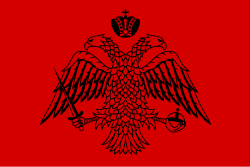Krokodeilos Kladas
Krokodeilos Kladas (Greek: Κροκόδειλος Κλαδάς, 1425–1490[1]) was a Greek military leader and rebel who fought in the medieval Peloponnese (called Morea) against the Ottoman Empire for the Republic of Venice during the 15th century.[2][3][4][5][6]

Biography
changeKrokodeilos Kladas, whose family moved from Epirus to the Peloponnese,[7] was born in Koroni in 1425.[8] His father was the Greek military chief Theodore Kladas.[2] When Sultan Mehmed II conquered the Despotate of the Morea in 1460, Kladas surrendered Saint George Castle and was given in exchange Vardounia Castle in Mani, as well as the territory of Elos.[9]
On 9 October 1480, Kladas led stratioti (Greek mercenary soldiers) from Koroni to attack Ottoman holdings in Mani. Both the Ottomans and the Venetians put a bounty on Kladas' head.[10] This rebellion was joined in December by stratioti from Nafplion led by Theodore Bua. An army sent by the Ottoman sultan was defeated between Passavas and Oitylo in February 1481. Later that month, a larger army under Mohammed Bey drove Kladas to Porto Kagio where he was boarded onto a Neapolitan galley abandoning his revolt. A peaceful settlement of the rebellion was negotiated by the Ottoman governor of the Morea and Venetian official Bartolomeo Minio. Meanwhile, Kladas went with a Neapolitan army to Ottoman-controlled Albania to aid an anti-Ottoman revolt there. In 1490, he was captured in battle near Monemvasia and flayed alive [11]
Family
changeThe Kladas family is known in records from the Morea since 1296 when a "Corcondille" captured a castle controlled by the Franks for the Byzantine Greeks.[12] Members of the family donated to a monastery at Mystra in 1366 and 1375.[13] A Krokodeilos appears in the satire of Mazaris as one of the rebels against the Byzantine emperor Manuel II in 1415.[14] The name "Krokontēlos" also appears on an inscribed donation to a church in Karytaina dated to the mid-1300s.[15] Krokodeilos Kladas and his brothers are respected in Venetian sources.[16] Also, Kladas was awarded Venetian knighthood and a gold robe just before the 1480 revolt.[17]
References
changeCitations
change- ↑ Pontificium Institutum Orientalium Studiorum 1992, p. 308.
- ↑ 2.0 2.1 Papadopoulos 1969, p. 115.
- ↑ Setton 1978, pp. 328, 551.
- ↑ British School at Athens 1908, p. 162: "This district seems to have been granted by Mohammed II, after the conquest of the Peloponnesus, as a military fief to Krokodeilos Kladas, a Greek guerrilla chief."
- ↑ Cheetham 1981, p. 249: "Among the Greek captains serving under Venetian command was a certain Korkodeilos Kladas, a landowner of sufficient status to have been granted estates in Lakonia when Sultan Mehmet first overran the Peloponnese, as a reward for submitting to the Turks."
- ↑ Merry 2004, "ARMATOLÍ", p. 26.
- ↑ Trombley 2009, p. 269.
- ↑ Kampouroglou n.d., p. 59.
- ↑ Philippides & Sphrantzes 1980, 40.9.
- ↑ Trombley 2009, p. 270.
- ↑ Kladas 1872, p. 11, quoting earlier testimony. Cited in Wright 1999, Appendix 8.
- ↑ Longnon 1911, pp. 803–817.
- ↑ Miklosich & Müller 1860, p. 482; Beēs 1907, pp. 247–248.
- ↑ Mazaris 1975, 84.12, p. 118.
- ↑ Feissel & Philippidis-Braat 1985, pp. 353–354.
- ↑ For examples, see Sathas 1885, Vol. 6, pp. 40–41; Barbarigo 1466, passim.
- ↑ Magno 1885, p. 220.
Sources
change- Barbarigo, Iacopo (1466). Dispacci. Vol. 6. Sathas. pp. 1–92.
- Beēs, Nikos A. (1907). "Διοπθωσεις καὶ παρατηρησεις εν Μυστρα μονη τὴς τὴς Παναγίας τοῦ Βροντοχιοῦ". Nea Siōn. 5: 245ff.
- British School at Athens (1908). The Annual of the British School at Athens (Issue 15). MacMillan.
- Cheetham, Nicolas (1981). Mediaeval Greece. New Haven, CT: Yale University Press. ISBN 0-300-10539-8.
- Feissel, Denis; Philippidis-Braat, Anne (1985). "Inventaires en vue d'un recueil des inscriptions historiques de Byzance: III, Inscriptions du Péloponnèse". Travaux et Mémoires. 9: 273–371.
- Kampouroglou, Dimitrios Gr. (n.d.). Αρματωλοί και Κλέφτες (1453–1821) (PDF). Athens: Εκδοτικός Οίκος Αγκύρας.
{{cite book}}: CS1 maint: year (link) - Kladas, Count Yannis (1872). Ἀρχαία Ἱστόρικα Γεγονότα τὴς Οἰκογενείας τῶν Κομετῶν Κλαδαίων ἀπὸ τὰ 1366 μέχρι 1803. Athens.
{{cite book}}: CS1 maint: location missing publisher (link) - Longnon, J., ed. (1911). Chronique de Morée. Livre de la Conqueste de la Princée de l'Amorée, 1204–1305. Paris: Renouard.
- Magno, Stefano (1885). Sathas, C.N. (ed.). Ėvénements Historiques en Grèce (1479–1497). Vol. 6. Paris: Monumenta Hellenicae Historiae. pp. 215–243.
- Mazaris (1975). Mazaris' Journey to Hades: Or, Interviews with Dead Men about Certain Officials of the Imperial Court (Seminar Classics 609). Buffalo, NY: Department of Classics, State University of New York at Buffalo.
- Merry, Bruce (2004). Encyclopedia of Modern Greek Literature. Westport, CT: Greenwood Press. ISBN 978-031-33081-3-0.
- Miklosich, Franz; Müller, Ioseph (1860). Acta et Diplomata Graeca Medii Aevi Sacra et Profana. Vol. Primum [Volume 1]. Vienna: Carolus Gerold.
- Papadopoulos, Panagiotēs B. (1969). Φράγκοι-Ενετοί, και Τούρκοι στην Πελοππόνησον, 1204-1821. Athens: Εκδόσεις Αφών Νάστου.
- Philippides, Marios; Sphrantzes, George (1980). The Fall of the Byzantine Empire: A Chronicle by George Sphrantzes (1401–1477). Amherst, MA: The University of Massachusetts Press.
- Pontificium Institutum Orientalium Studiorum (1992). Orientalia Christiana Periodica, Volume 58. Pontificium Institutum Orientalium Studiorum.
- Sathas, Konstantinos N. (1885). Μνημεία Ελληνικής Ιστορίας: Documents inédites rélatifs à l'histoire de la Grèce au moyen âge. Vol. 6. Paris: Maissoneuve Frère et Ch. Leclerc.
- Setton, Kenneth M. (1978). The Papacy and the Levant, Vol. 1. Philadelphia, PA: American Philosophical Society. ISBN 978-960-98903-5-9.
- Trombley, Frank (2009). "The Fall of Constantinople in 1453 and Late Medieval Greek Culture: The Experience of Defeat". Groniek Historisch Tijdschrift. 184: 267‒284.
- Wright, Diana Gilliland (1999). Bartolomeo Minio: Venetian Administration in 15th-Century Nauplion (Doctoral Dissertation). Washington, DC: The Catholic University of America.
Further reading
change- Rankabēs, Eugenios Rizos (1925). "Clada". Livre d'or de la noblesse ionienne (Volume 2). Athens, Greece: Maison d'éditions "Eleftheroudakis". pp. 153–167.
- Zakythinos, Dionysios A. (1953). Le despotat grec de Morée II. Vie et institutions (in French). Athens: l'Hellénisme contemporain.